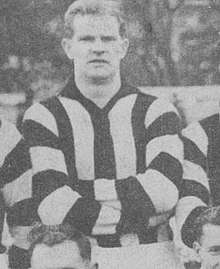Bob Galbally
Robert Thomas John Galbally FRACP (18 January 1921 – 14 April 2004) was a doctor and Australian rules footballer.
Bob Galbally | |||||||||||||||||||||||||||||||||||||||||||
|---|---|---|---|---|---|---|---|---|---|---|---|---|---|---|---|---|---|---|---|---|---|---|---|---|---|---|---|---|---|---|---|---|---|---|---|---|---|---|---|---|---|---|---|
 Galbally in 1944 | |||||||||||||||||||||||||||||||||||||||||||
| Born | Robert Thomas John Galbally 18 January 1921 | ||||||||||||||||||||||||||||||||||||||||||
| Died | 14 April 2004 (aged 83) | ||||||||||||||||||||||||||||||||||||||||||
| Alma mater | University of Melbourne | ||||||||||||||||||||||||||||||||||||||||||
| Occupation | doctor | ||||||||||||||||||||||||||||||||||||||||||
| Years active | 1945–2000 | ||||||||||||||||||||||||||||||||||||||||||
| Spouse(s) | Joan Collins ( m. 1945) | ||||||||||||||||||||||||||||||||||||||||||
| Children | Nine | ||||||||||||||||||||||||||||||||||||||||||
| Family | Jack Galbally and Frank Galbally (brothers) | ||||||||||||||||||||||||||||||||||||||||||
| |||||||||||||||||||||||||||||||||||||||||||
He attended St Patrick's College and studied medicine at the University of Melbourne. He graduated in 1944. He first worked at Melbourne's St Vincent's Hospital then for a few months in general practice with his brother-in-law at Coburg before moving to a practice at Hartwell. After 30 years, he moved the practice to East Camberwell until he retired in 2000.[1]
Football
Galbally played 8 games with the Collingwood in 1944 in the Victorian Football League (VFL).[2] He ended the season as tied leading goalkicker, having scored 26, the same as Lou Richards.
Family
Galbally was the seventh of nine children of William and Eileen Galbally. Two of his brothers, Jack Galbally MLC and Frank Galbally, also played for Collingwood and were criminal lawyers. Sister Kathleen Galbally was an anaesthetist and brother Bryan Galbally a specialist in intensive care. He married Joan Collins in 1945 and they had nine children.[1]
Notes
- JF Gurry. "College Roll: Galbally, Robert Thomas John". College Roll. Royal Australasian College of Physicians. Retrieved 13 March 2017.
- Holmesby, Russell; Main, Jim (2014). The Encyclopedia of AFL Footballers: every AFL/VFL player since 1897 (10th ed.). Seaford, Victoria: BAS Publishing. p. 301. ISBN 978-1-921496-32-5.
External links
| Wikimedia Commons has media related to Bob Galbally. |
- Bob Galbally's playing statistics from AFL Tables
- Profile on Collingwood Forever